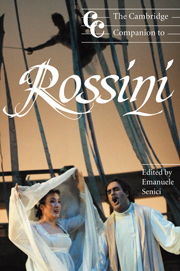1 - Introduction: Rossini's operatic operas
Published online by Cambridge University Press: 28 September 2011
Summary
‘Since the death of Napoleon, another man has appeared who is talked about every day in Moscow as in Naples, in London as in Vienna, in Paris as in Calcutta. The fame of this man knows no bounds save those of civilisation itself; and he is not yet thirty-two!’ The opening words of Rossini's first biography – by none other than Stendhal, and published in Paris in 1824 – help introduce what at first might seem an extravagant claim: Rossini was Europe's most famous composer in the first half of the nineteenth century; his music reached the largest number of listeners, whether in opera houses, or concert halls, or played in countless arrangements printed for all sorts of performing forces, or simply whistled in the streets. In other words, nineteenth-century musical culture cannot be understood without taking Rossini into prominent account; any history that relegates Rossini to a secondary rôle must to some extent ignore the tastes of those who inhabited the period. And yet such histories have been the norm rather than the exception in the past century, especially in the English-speaking world.
The reasons behind this historiographical neglect are numerous and diverse, but chief among them is probably the progressive disappearance of Rossini's works from the repertory of opera houses during the second half of the nineteenth century, a trend not reversed until the later decades of the twentieth. Only a handful of his comic operas were performed, especially Il barbiere di Siviglia, which remains the most popular and frequently revived.
- Type
- Chapter
- Information
- The Cambridge Companion to Rossini , pp. 1 - 8Publisher: Cambridge University PressPrint publication year: 2004
- 1
- Cited by



